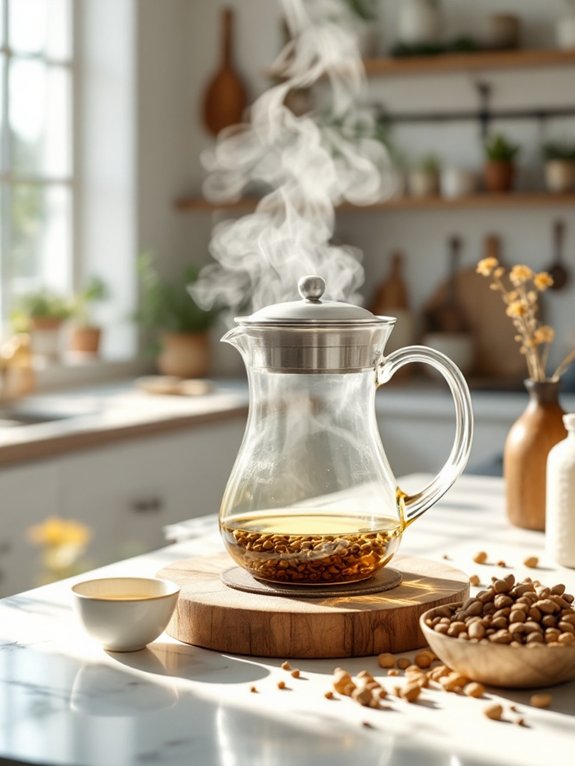
Unlocking the Essence: A Guide to Brewing Exquisite White Tea
Imagine a cup of tea so delicate, its flavor whispers of springtime blossoms and sun-kissed meadows. this is the magic of white tea, a treasure trove of subtle sweetness and nuanced aromas. Revered for centuries in China, white tea has captivated palates with its unique character and remarkable health benefits.
This guide will unveil the secrets to brewing the perfect cup of white tea,transforming your daily ritual into a moment of pure tranquility and sensory delight. We’ll delve into the origins of this exquisite beverage, explore the essential tools for brewing, and master the art of extracting its delicate essence.
From Bud to Cup: A Journey Through Time
White tea earns its name from the fine, silvery hairs that adorn the unopened buds and young leaves it is crafted from.Thes precious leaves are minimally processed, undergoing only withering and drying – a gentle approach that preserves their natural integrity and subtle flavors.
Legend has it that white tea was discovered serendipitously in ancient China when tea leaves were accidentally left to dry under the sun. This simple act unlocked a world of delicate flavor and unparalleled health benefits. Today, white tea remains a prized beverage, celebrated for its antioxidant power and calming properties.
Essential Tools for Brewing Perfection
Crafting a truly remarkable cup of white tea requires attention to detail and the right tools:
Glass Teapot: A clear glass teapot allows you to witness the mesmerizing dance of leaves as they unfurl and release their essence. Tea Strainer: Choose a fine-mesh strainer to capture even the smallest leaf fragments, ensuring a smooth and enjoyable cup.
Thermometer: Precise temperature control is crucial for white tea. A thermometer ensures you brew at the optimal range (170-185°F) to avoid bitterness.
The Art of Brewing: Step by Step
- Measure with Precision: Start with 1 teaspoon of loose leaf white tea per 8 ounces of water. Adjust the amount to your preference, remembering that white tea is delicate and can easily become over-steeped.
- Gentle Infusion: Pour hot water (170-185°F) directly over the leaves in your teapot. Avoid pouring boiling water as it can scorch the delicate leaves and impart a bitter taste.
- Steeping Time is Key: Allow the tea to steep for 2-3 minutes, observing the color change from pale yellow to a gentle golden hue. Longer steeping times will result in a stronger flavor but may also lead to bitterness.
- Swirl and Savor: Gently swirl the teapot before pouring to ensure even distribution of flavors.
- Taste and Adjust: Sip your tea mindfully, appreciating its subtle sweetness and floral notes. If desired, adjust the steeping time for future brews to achieve your perfect cup.
Beyond the Basics: Exploring Culinary Infusions
White tea’s delicate flavor profile makes it an ideal canvas for culinary experimentation. Consider these infusions to elevate your dishes:
White Tea-Infused Honey: Steep white tea leaves in honey for a subtly sweet and floral condiment perfect for drizzling over yogurt, pancakes, or roasted vegetables.
White Tea Syrup: Simmer white tea with sugar and water to create a refreshing syrup for cocktails, lemonade, or iced tea.
Frequently Asked Questions
Can White Tea Be Flavored With herbs or Fruits?
Absolutely! Experiment with adding fresh herbs like mint, lavender, or chamomile during the steeping process. For fruity infusions, try slices of peach, strawberry, or mango. Remember to adjust steeping times accordingly.
How Should I store Leftover White Tea Leaves?
Store leftover white tea leaves in an airtight container away from direct sunlight and moisture. Properly stored, they will retain their freshness for several months.
Is White Tea Caffeine-Free?
White tea contains a moderate amount of caffeine, though less than black or green tea. If you are sensitive to caffeine, consider brewing it for a shorter duration or opting for decaffeinated varieties.Can I Brew White Tea in a Cold Brew Method?
Yes! Steep white tea leaves in cold water for 6-8 hours in the refrigerator for a refreshing and less caffeinated beverage.
What Are the Health Benefits of White Tea?
White tea is rich in antioxidants, notably polyphenols, which have been linked to numerous health benefits, including:
Boosting Immunity: Antioxidants help protect cells from damage caused by free radicals, strengthening the immune system.
promoting Heart Health: Studies suggest that white tea may help lower blood pressure and cholesterol levels.
Supporting Brain Function: White tea contains L-theanine,an amino acid known to promote relaxation and focus.
Conclusion: A Journey of Flavor and Wellness
Brewing white tea is more than just a beverage preparation; it’s a mindful ritual that connects you with ancient traditions and unlocks the subtle beauty of nature. With each sip,savor the delicate flavors,appreciate the calming aroma,and embrace the potential health benefits this exquisite tea offers.







